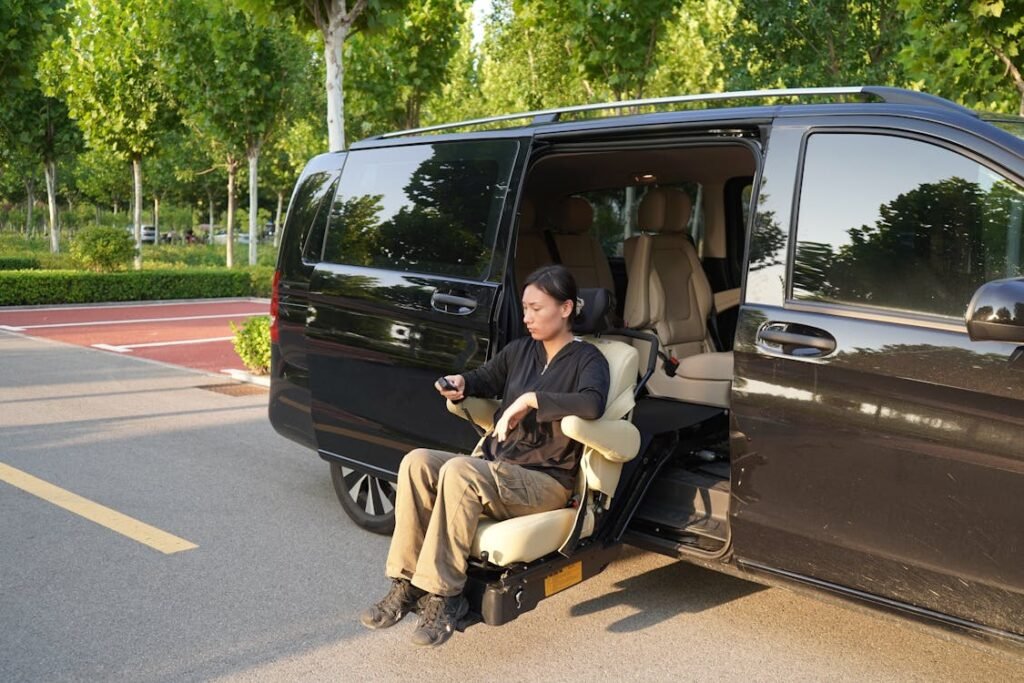Accessibility is not just about convenience; it is about inclusion. People with disabilities deserve to live independently, access public spaces, and participate fully in society without unnecessary barriers. From mobility aids to smart technology, accessibility solutions are transforming lives and creating opportunities for individuals to thrive.
Advancements in technology and inclusive design have made it possible for people with disabilities to navigate the world with greater ease. Whether it’s improved transportation, adaptive workspaces, or assistive communication tools, these innovations are breaking down barriers and promoting equality.
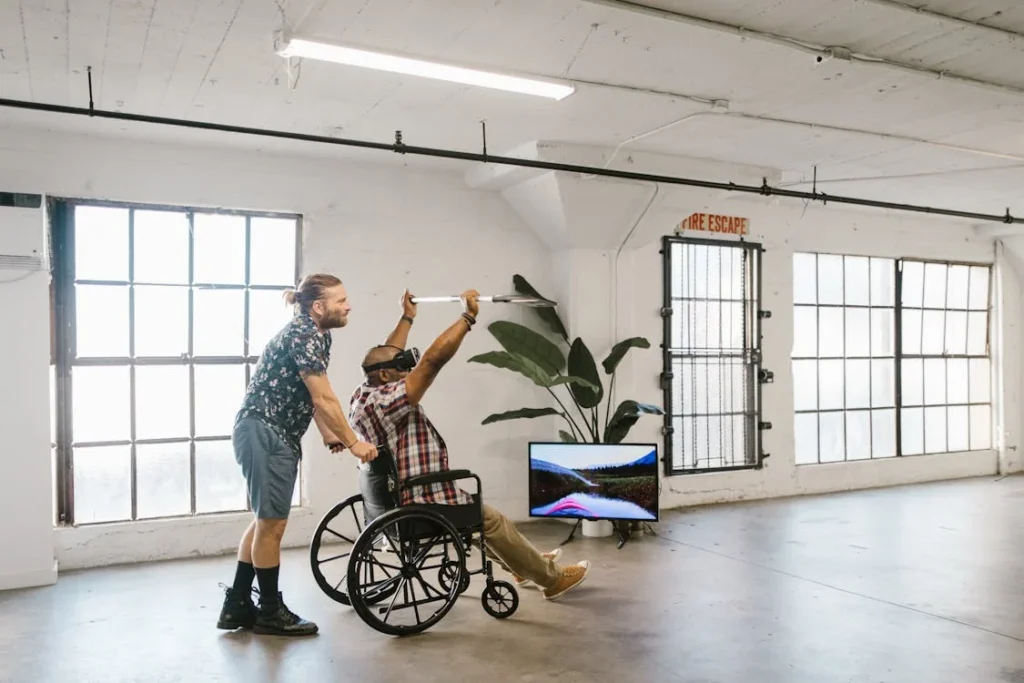
Mobility Solutions for Greater Independence
Mobility plays a crucial role in daily life, allowing individuals to move freely and engage with their surroundings. For people with disabilities, mobility solutions provide the independence to navigate homes, workplaces, and public spaces with confidence.
Whether someone has a temporary or permanent disability, the right mobility aids can significantly improve their quality of life.
Advancements in Mobility Aids
Traditional mobility aids such as wheelchairs, crutches, and walkers have long been essential for people with mobility impairments. However, modern technology has transformed these devices, making them more comfortable, efficient, and user-friendly.
Electric wheelchairs and mobility scooters provide increased autonomy, especially for individuals who may not have the upper body strength to use a manual wheelchair.
Lightweight and foldable designs have also made mobility aids easier to transport, allowing for greater flexibility in daily life.
Prosthetic limbs have also seen remarkable advancements. At Robobionics, we have developed solutions like the Grippy™ bionic hand, which provides a highly functional and ergonomic design for upper limb amputees.
These innovations allow users to regain independence by performing daily tasks such as holding objects, writing, or using tools with ease. If you are considering a prosthetic solution, reach out to us today to learn how our technology can improve your mobility and quality of life.
Public Spaces and Transportation Accessibility
Access to public spaces is a fundamental right, yet many cities still have barriers that make navigation difficult for people with disabilities. Ramps, elevators, and tactile paving help individuals with mobility and visual impairments move safely through urban environments.
Many governments and organizations are now prioritizing inclusive infrastructure, ensuring that sidewalks, pedestrian crossings, and public buildings are accessible to all.
Transportation is another critical aspect of mobility. Accessible public transportation systems, such as low-floor buses, wheelchair-friendly metro stations, and designated seating areas, make commuting easier for individuals with disabilities.
Ride-sharing services and specialized transport options, such as wheelchair-accessible taxis, are also improving accessibility in many cities.
For people who drive, hand-controlled vehicles and adaptive car modifications allow them to travel independently. Innovations such as voice-activated controls and customized driving solutions are making personal transportation more accessible than ever before.
Home Modifications for Better Accessibility
Independence begins at home, and making living spaces more accessible is essential for people with disabilities. Simple modifications such as widened doorways, grab bars in bathrooms, and adjustable countertops can make a significant difference.
Smart home technology has further improved accessibility by allowing individuals to control lights, doors, and appliances with voice commands or mobile apps.
Accessible furniture, such as height-adjustable beds and motorized recliners, provides comfort and ease of movement. Kitchen adaptations, including pull-out shelves and easy-grip utensils, ensure that cooking and meal preparation remain an independent activity.
These small but impactful modifications help create a barrier-free home environment where individuals can live comfortably and safely.
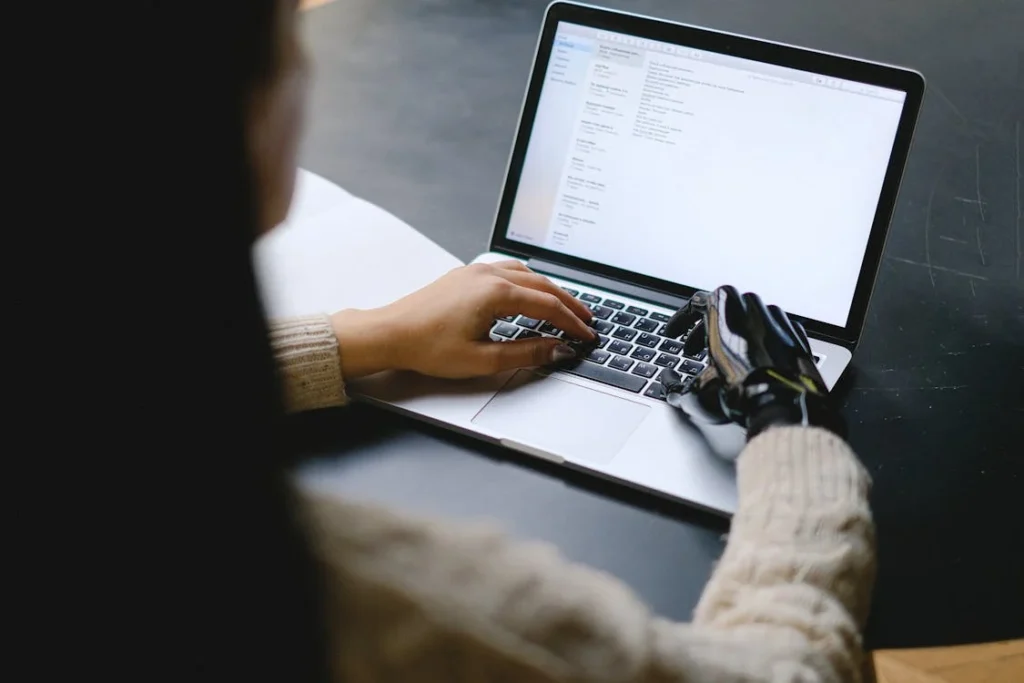
Digital Accessibility and Assistive Technology
Technology has transformed the way people interact with the world, making life more connected and efficient. For individuals with disabilities, digital accessibility and assistive technology provide new opportunities for communication, learning, and work.
From screen readers to voice recognition software, these tools help bridge the gap and ensure that digital spaces are inclusive for everyone.
Making the Online World Inclusive
The internet is an essential part of daily life, whether for education, employment, or social interactions. However, many websites and digital platforms still pose challenges for individuals with disabilities.
People with visual impairments may struggle with poorly designed websites, while those with mobility limitations may find it difficult to navigate online content without adaptive tools.
To address this, web accessibility guidelines, such as the Web Content Accessibility Guidelines (WCAG), have been established to make digital platforms more inclusive.
Features such as text-to-speech options, keyboard navigation, and high-contrast modes allow individuals with disabilities to browse websites with ease. Many companies are now recognizing the importance of designing user-friendly websites that accommodate diverse needs.
Mobile accessibility is another crucial aspect of digital inclusion. Smartphones and tablets now offer built-in accessibility features, such as voice commands, magnification settings, and alternative input methods.
Applications designed for people with disabilities, including speech-to-text apps and navigation assistants, further enhance digital accessibility.
Assistive Technology for Everyday Use
Assistive technology has opened new doors for people with disabilities by enabling them to perform tasks that were once difficult or impossible.
Speech recognition software allows individuals with mobility impairments to type and control devices using their voice. Eye-tracking technology enables users to navigate computers and communicate without using their hands.
For individuals with hearing impairments, real-time captioning and sign language translation software provide better access to conversations, meetings, and online content.
Text-to-speech tools help those with dyslexia or learning disabilities read digital content more easily. These advancements empower people to interact with technology on their terms, making everyday activities more accessible.
The Role of AI and Smart Devices
Artificial intelligence (AI) has made assistive technology more intuitive and efficient. Virtual assistants such as Siri, Alexa, and Google Assistant allow users to control their environment using voice commands.
AI-powered transcription services provide accurate real-time captions, benefiting people who are deaf or hard of hearing.
Smart home devices have further enhanced accessibility by enabling individuals to control appliances, doors, and lighting through voice commands or mobile apps.
For people with limited mobility, these technologies provide greater independence, allowing them to perform daily tasks without physical effort.
At Robobionics, we believe that technology should empower everyone. Our advanced prosthetic solutions integrate with modern assistive technology to enhance usability and independence.
If you are looking for a prosthetic that supports your digital lifestyle, contact us today to explore our innovative solutions.
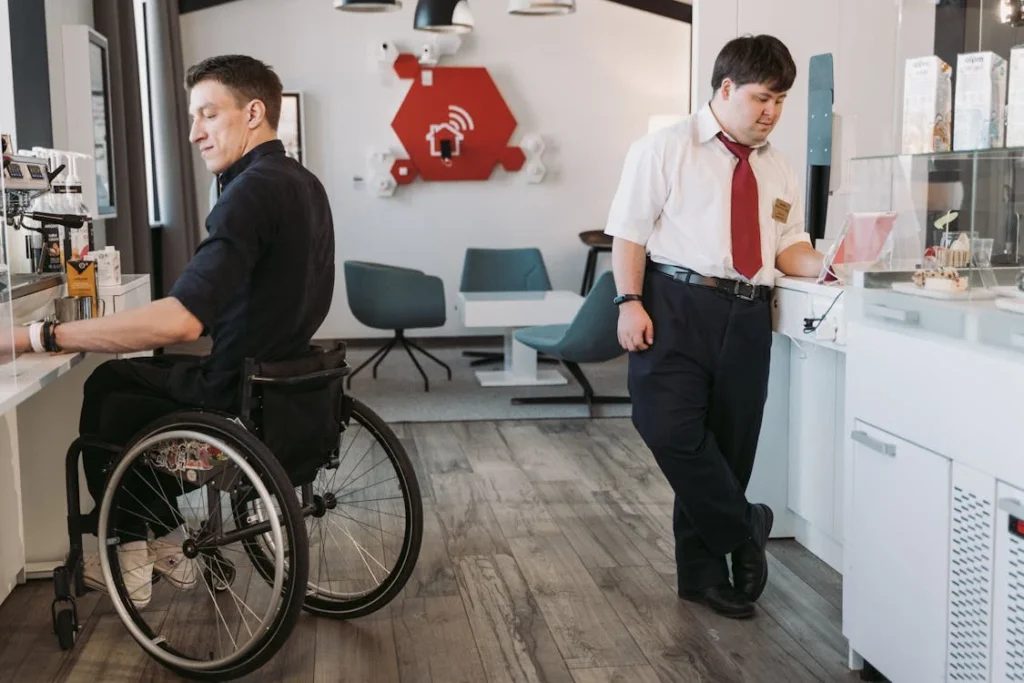
Workplace Accessibility and Inclusive Employment
Employment is a key aspect of independence and financial stability. However, people with disabilities often face barriers in the workplace, from physical obstacles to outdated attitudes about their capabilities.
Creating accessible work environments and promoting inclusive hiring practices ensure that individuals with disabilities have equal opportunities to contribute and succeed.
Adapting Workspaces for Accessibility
A truly inclusive workplace starts with physical accessibility. Office spaces should accommodate employees with mobility impairments by ensuring step-free entry, accessible restrooms, and adjustable desks.
Workstations should be flexible to meet different needs, whether through ergonomic chairs, one-handed keyboards, or voice-controlled computer systems.
Employers who invest in accessibility not only support their employees but also create a more productive and diverse work environment.
Digital accessibility in the workplace is just as crucial. Many jobs require the use of computers and software, and individuals with disabilities should be able to navigate these tools without barriers.
Screen readers, voice dictation software, and adaptive keyboards enable employees to perform their tasks efficiently.
Cloud-based collaboration tools and remote work options further enhance accessibility by allowing employees to work in environments best suited to their needs.
Inclusive Hiring Practices and Career Growth
Despite advancements in accessibility, many people with disabilities still face discrimination in hiring. Companies must shift their focus from perceived limitations to recognizing the strengths and skills individuals bring to the table.
Providing equal opportunities starts with inclusive hiring practices that remove biases and ensure a fair recruitment process.
Employers should focus on skills rather than disabilities when evaluating candidates. Offering flexible work arrangements, mentorship programs, and training sessions can help employees with disabilities adapt to their roles and advance in their careers.
Promoting a workplace culture that values diversity and inclusion benefits not only employees with disabilities but also the organization as a whole.
Government initiatives and disability employment programs also play a role in creating inclusive workplaces. Many countries offer incentives for businesses that hire people with disabilities, encouraging greater workforce participation.
Companies that actively support accessibility often see increased innovation and employee satisfaction.
At Robobionics, we believe that everyone deserves access to meaningful work. By designing advanced prosthetic solutions that enhance functionality and confidence, we empower individuals to pursue their career goals without limitations.
If you are looking for an adaptive solution to improve your work experience, reach out to us today to explore how our prosthetics can support your professional journey.
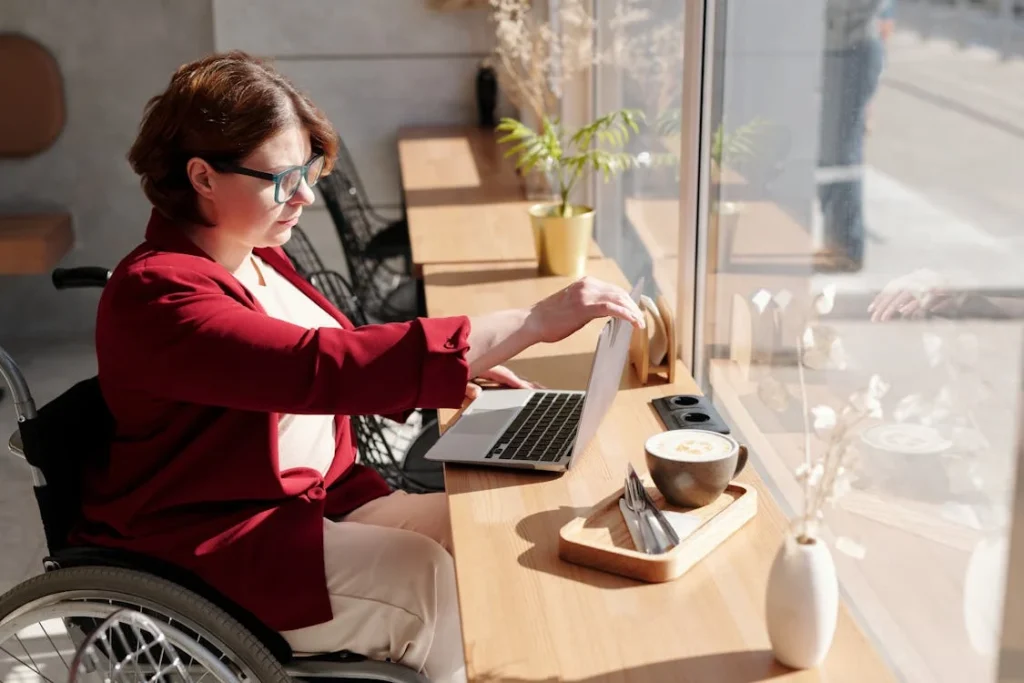
Accessible Education and Learning Opportunities
Education is a powerful tool for independence and self-growth, yet many students with disabilities face barriers that limit their access to learning.
Whether in schools, universities, or online programs, creating accessible education ensures that individuals with disabilities have the same opportunities to develop their skills and reach their full potential.
Inclusive Classrooms and Learning Environments
Physical accessibility is the first step toward an inclusive education system. Schools and universities must ensure that classrooms, libraries, and common areas are wheelchair-friendly with ramps, elevators, and accessible seating.
Restrooms, entrances, and hallways should be designed to accommodate students with mobility challenges. Providing adjustable desks, ergonomic chairs, and specialized equipment creates a learning environment that supports all students.
For students with visual impairments, braille textbooks, audio learning materials, and screen-reading software allow them to engage with course content effectively.
Similarly, students with hearing impairments benefit from real-time captioning, sign language interpreters, and hearing loop systems in lecture halls. These modifications ensure that learning is accessible to all, regardless of physical abilities.
Digital Learning and Assistive Technology
Technology has transformed education, making learning more flexible and accessible. Online courses, virtual classrooms, and e-learning platforms provide students with disabilities the freedom to study at their own pace.
Many educational institutions now offer remote learning options, which benefit students who may struggle with daily commutes or physical classroom settings.
Assistive technology has further enhanced digital learning. Speech-to-text software helps students who have difficulty writing, while text-to-speech programs assist those with reading challenges.
Interactive whiteboards, voice-controlled study tools, and customized learning apps provide additional support for students with different needs.
AI-driven learning platforms can personalize educational experiences, adjusting content based on a student’s learning style and pace. These advancements are breaking down traditional barriers, allowing students with disabilities to fully participate in education without restrictions.
Supporting Students with Disabilities Beyond the Classroom
Beyond physical and digital accessibility, emotional and academic support is crucial for students with disabilities.
Schools and universities should provide mentorship programs, counseling services, and peer support groups to help students navigate academic challenges and social interactions.
Inclusive extracurricular activities, such as adaptive sports, clubs, and arts programs, encourage participation and community engagement.
Scholarships, grants, and financial aid programs specifically designed for students with disabilities also play a vital role in ensuring equal educational opportunities.
Governments, non-profit organizations, and private institutions are increasingly offering financial support to help cover tuition fees, assistive technology, and adaptive learning materials.
At Robobionics, we recognize the importance of education in shaping futures. Our prosthetic solutions empower students to engage in academic and extracurricular activities without limitations.
If you are looking for an assistive solution that supports your learning journey, contact us today to explore our advanced prosthetics designed for everyday functionality.
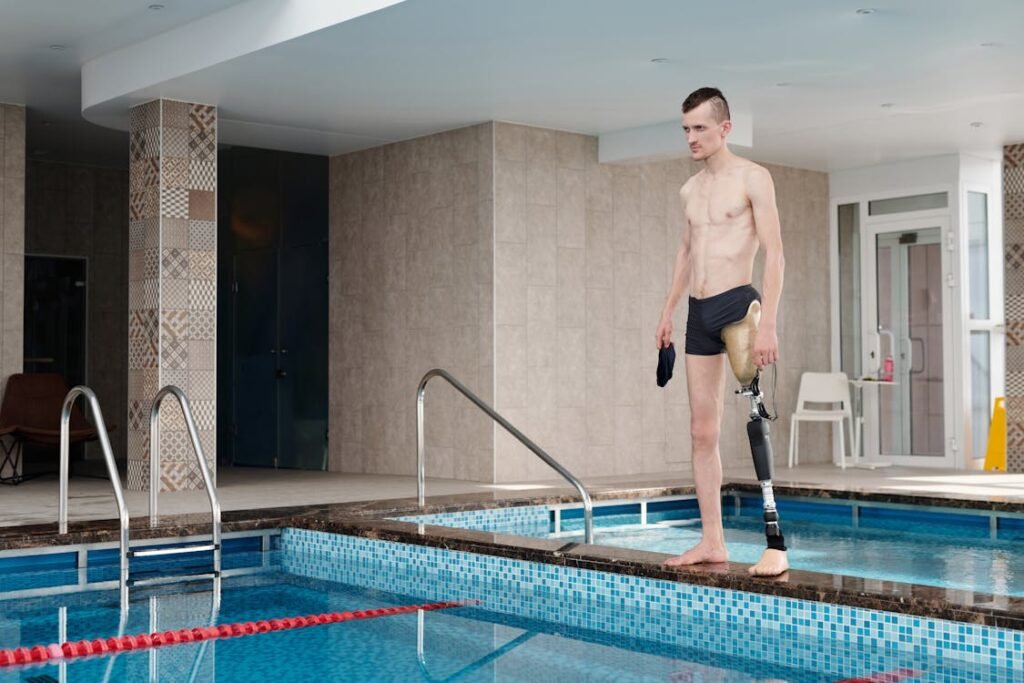
Sports, Recreation, and Community Participation
Engaging in sports and recreational activities is essential for overall well-being, social connection, and confidence. For individuals with disabilities, accessibility in these areas can significantly impact physical health and emotional resilience.
Whether through adaptive sports, inclusive leisure activities, or community programs, the ability to participate fully in society fosters a sense of belonging and empowerment.
Adaptive Sports and Physical Activity
Sports have long been associated with strength and endurance, but accessibility in athletics has transformed how individuals with disabilities engage in physical activities.
Adaptive sports, such as wheelchair basketball, para-swimming, and amputee running, offer opportunities to stay active while challenging physical limitations.
Many sports organizations now provide specialized training, adaptive equipment, and coaching to help athletes with disabilities perform at competitive levels.
Prosthetic advancements have played a major role in expanding sports accessibility. Running blades, specialized prosthetic limbs, and custom orthotics allow athletes to perform at high levels while ensuring comfort and safety.
At Robobionics, we are dedicated to creating prosthetic solutions that support an active lifestyle. If you are looking for a prosthetic that can help you get back into sports or fitness activities, reach out to us today to explore our innovations.
For individuals with mobility impairments, adaptive fitness programs provide customized workout plans that cater to different needs. Wheelchair-accessible gyms, seated exercise classes, and virtual training sessions make it easier for people to maintain their physical fitness.
Staying active improves circulation, strengthens muscles, and boosts overall health, making it a key component of independent living.
Inclusive Recreational Activities
Beyond sports, recreational activities such as traveling, music, and arts should be accessible to everyone.
Many travel destinations now offer wheelchair-friendly tours, accessible hotels, and adaptive adventure experiences like para-skiing and scuba diving for people with disabilities.
The rise of inclusive travel services ensures that individuals can explore the world without unnecessary barriers.
Participation in music, dance, and visual arts has also become more inclusive with the help of adaptive instruments, sign language interpretation for performances, and accessible art workshops.
Creativity is a fundamental part of self-expression, and accessibility in the arts provides people with disabilities a platform to share their talents and stories.
Community Engagement and Social Inclusion
Strong communities thrive when they include everyone. Accessibility in social spaces, places of worship, and community events ensures that people with disabilities can connect with others and contribute meaningfully.
Volunteer opportunities, advocacy programs, and disability awareness campaigns encourage social participation while promoting inclusion and understanding.
Support groups and mentorship programs further strengthen community bonds by providing individuals with disabilities the opportunity to share experiences, seek advice, and build lasting relationships.
Digital platforms and online communities also help people connect beyond physical barriers, offering support and resources to navigate challenges.
At Robobionics, we believe that accessibility goes beyond mobility—it is about ensuring that everyone has the opportunity to live fully.
If you are looking for prosthetic solutions that enhance your ability to participate in sports, recreation, or social activities, contact us today to learn more about how we can support your journey.

Legal Rights and Policies for Accessibility
Accessibility is not just a matter of convenience—it is a fundamental right. Governments around the world have introduced laws and policies to ensure that people with disabilities have equal access to education, employment, public spaces, and services.
Understanding these rights empowers individuals to advocate for themselves and seek necessary accommodations.
Disability Rights and Anti-Discrimination Laws
Many countries have implemented legislation to protect the rights of people with disabilities.
In India, the Rights of Persons with Disabilities (RPWD) Act, 2016 is a landmark law that promotes inclusion and prohibits discrimination in employment, education, healthcare, and access to public services.
It mandates that private and public institutions provide reasonable accommodations and ensures that workplaces, schools, and transportation systems are accessible.
Globally, laws such as the Americans with Disabilities Act (ADA) in the United States and the Equality Act in the UK set similar standards for accessibility and non-discrimination.
These laws protect individuals from being denied opportunities due to disability and hold organizations accountable for making necessary modifications.
If you ever face discrimination due to a lack of accessibility, you have the right to report it and seek legal support. Disability advocacy groups and government agencies can assist in filing complaints and ensuring that organizations comply with legal standards.
Accessibility in Public Spaces and Transportation
Governments worldwide are making efforts to improve accessibility in urban planning and public infrastructure. Accessible transportation, including low-floor buses, wheelchair-friendly train stations, and reserved seating, is becoming more common.
Policies now require that new buildings incorporate ramps, elevators, and accessible restrooms to accommodate individuals with disabilities.
Despite these advancements, challenges remain. Many older buildings and public spaces still lack proper accessibility features. While laws mandate accessibility compliance, enforcement is sometimes inconsistent.
Advocacy efforts by disability rights organizations continue to push for stronger implementation and stricter penalties for non-compliance.
Financial Assistance and Support Programs
To support accessibility, governments and organizations offer financial assistance programs for people with disabilities.
In India, schemes such as the Sugamya Bharat Abhiyan (Accessible India Campaign) focus on improving public infrastructure and providing assistive technology to those in need.
Additionally, disability pension programs and tax benefits help individuals manage healthcare and accessibility costs.
Internationally, grants and financial aid are available for assistive devices, home modifications, and mobility aids. Many NGOs and charitable organizations also provide funding for prosthetics and rehabilitation services.
At Robobionics, we are committed to making advanced prosthetic solutions affordable and accessible. If you are looking for a reliable, high-quality prosthetic, reach out to us today to explore available options and support programs.
Understanding your rights and available resources is crucial for achieving independence and ensuring equal opportunities. By staying informed and advocating for better accessibility, individuals with disabilities can help shape a more inclusive society.
Conclusion
Accessibility is about more than just removing barriers—it is about creating opportunities for people with disabilities to live independently, work, learn, and participate in society without limitations. From mobility aids and assistive technology to inclusive workplaces and adaptive sports, advancements in accessibility are transforming lives. With the right support, individuals with disabilities can pursue their goals, engage in meaningful activities, and embrace new experiences with confidence.
Innovation continues to drive accessibility forward, making everyday life more inclusive and empowering. However, true inclusion requires ongoing efforts from communities, businesses, and governments to ensure that accessibility is a priority in all aspects of life. When society invests in accessible solutions, everyone benefits.
At Robobionics, we are committed to improving accessibility through advanced prosthetic solutions designed to restore independence and enhance quality of life. If you are looking for a prosthetic that supports your lifestyle and ambitions, reach out to us today to explore how we can help. Your journey toward greater independence starts with the right support—and we are here to be part of it.



